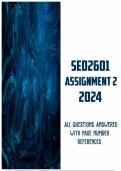, PLEASE USE THIS DOCUMENT AS A GUIDE TO ANSWER YOUR ASSIGNMENT
Please note that the author of this document will not responsibility for any plagiarizing you
commit.
Question 1
1.1. Discuss what is meant by “sociology”.
Sociology is the study of human social behavior, relationships, and institutions. It involves the
analysis of social factors such as ideas, feelings, and ways of behaving that persist over time and are
imposed upon all people who are born into a society. Sociology also involves the study of social
interactions amongst groups, organizations, societies, and the world. The field was established by
Western intellectuals such as Karl Marx, Herbert Spencer, Emile Durkheim, George Herbert Mead,
Max Weber, Talcott Parsons, and Alfred Schutz. The word 'sociology' is a combination of the Latin
word socius, meaning 'companion', and the Greek word logos, meaning 'the study of'. Thus,
sociology is the study of companionship or social relations. (Chapter 1 - Page 2)
1.2. Define the concept of education.
Education can be defined as the act or process of imparting or acquiring general knowledge,
developing the powers of reasoning and judgment, and preparing individuals intellectually for
mature life. It is not a static phenomenon, but a dynamic and ever-changing process. Education
serves as a form of socialization, and it is the means through which knowledge and learning skills are
acquired. The word 'education' has its origins in the Latin word educere, which means 'to bring out
that which is within'. It is particularly concerned with eliciting the human values that are latent in
every human being and must be drawn out. (Chapter 1 - Page 3)
1.3. Briefly explain the following terms:
A) Assimilation
The process by which a person or persons acquire the social and psychological characteristics of a
group. (Chapter 4 - Page 95)
B) Society
Humans in groups and the context in which people live and relate to one another. Societies can be
distinguished between pre-modern and modern societies. In the sociology of education course, we
focus on modern societies because the education system as we know it is a product of modern,
industrialised societies. (Chapter 4 - Page 101)
C) Ecology of a school
The school climate or school environment, which reflects the school's own personality and unique
character. (Chapter 4 - Page 96)





